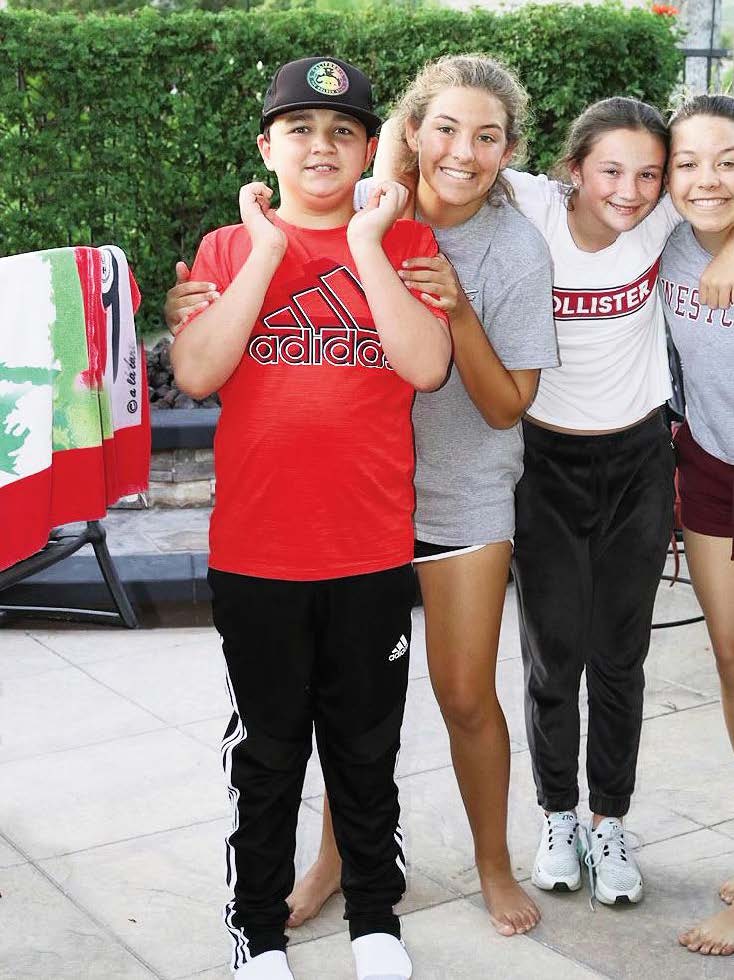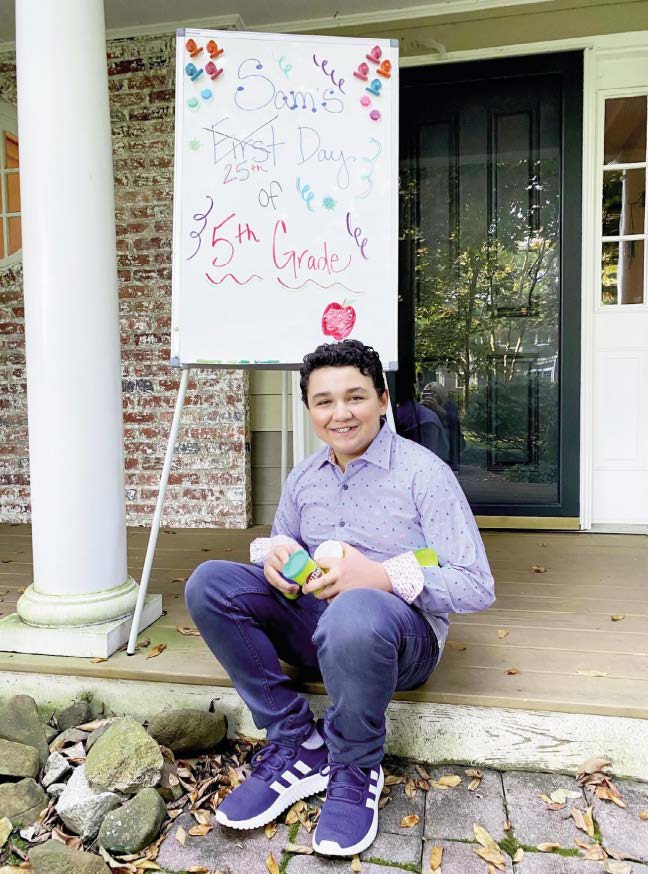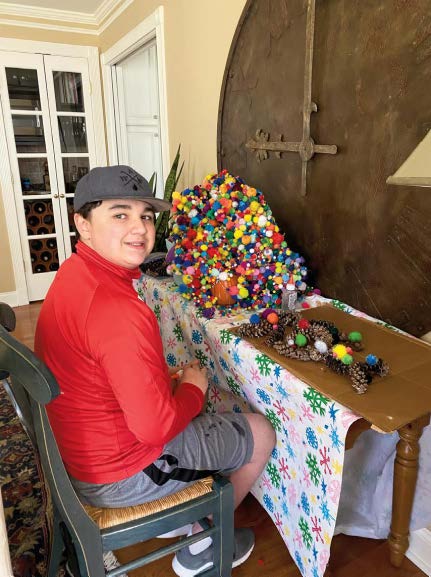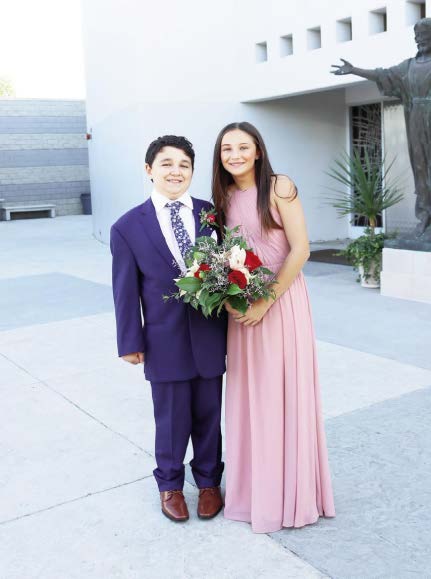COVER STORY
"My son is the greatest gift I could have asked for. He has taught me more about myself and the resilience I didn't know I possessed. No other person or situation has better prepared me for this life."
86400 Seconds, 1440 Minutes, 24 Hours…

TODAY, AND DAYS AHEAD: (from left to right) Sam with cousin Gianna, sister Marilee and cousin Jaden. "Every day, I wonder if Sam is happy, and whether or not his happiness and best interest will consume someone else after I'm gone."
A Day in the Life
BY BARBIE VARTANIAN
autism awareness THE ANNUAL ISSUE
As a mother of a child on the spectrum, I have a special relationship with April, otherwise known as Autism Awareness Month. I remember the day I learned I was having a boy like it was yesterday. Pure joy and happiness, knowing my family was just as I had dreamt it would be, a little girl born just 12 months before and now, Sam would soon arrive.
Then, one evening, I found myself in front of the television, captivated by an interview with Larry King and Jenny McCarthy. She was telling the story of her son Evan who was recently diagnosed with autism. With her developmental pediatrician by her side, they talked candidly about what autism was and its potential causes. At that moment, my excitement of having this little boy turned to concern and a touch of fear.
My pregnancy was typical; perhaps with Sam, there was a little less movement than his sister, but I just figured that was a "girl" thing, always on the move. The night Sam was born, I received an epidural and Sam's heartrate immediately plummeted; the doctor watched it closely and said if it didn't go back up, he would do an emergency C-section. It did eventually stabilize, but I thought "was it too long," and no one will never know.
Once Sam was born, his APGAR score was good, but after they took him to be circumcised, he stopped eating... he dropped a concerning amount of weight, and I was told to take him immediately to the pediatrician when we left the hospital. We were eventually able to get the weight back on after a couple of weeks, but it has been a rollercoaster ride since. As the months passed, Sam reached most of his developmental milestones. He recognized his parents, was able to hold his head up, crawl, and make sounds that all new parents look forward to with their children.
At two months of age, it was time for Sam's first vaccinations. Sam immediately spiked a fever for several days, not uncommon when children receive their vaccines. His second dose, four months later, once again caused a reaction that left me with significant concern. I decided at that time to forego any further vaccinations. I felt that his immune system was compromised in some manner and the risk wasn't worth it. He has not received any other inoculations to this day. I did not, and still do not believe that the vaccine caused Sam's autism, but I wasn't comfortable moving forward with the vaccines.
At nine to ten months, Sam could stand while holding on, grab his favorite toy, and play peek-a-boo. It was close to him turning a year old that the delays in communication, cognitive-reasoning, and repetitive sensory-seeking headshaking (not words I had ever used, but would soon become part of my everyday vocabulary), had become more evident that something wasn't necessarily right. I consulted with a family friend who had a child on the spectrum. She confirmed the behavior could be indicative of autism, and recommended that I contact the Regional Center, (part of the Division of Developmental Services in California) for an assessment. Two weeks later, services began; speech, occupational therapy (OT) and applied behavioral analysis (ABA). I was told that early intervention made all the difference, so I was thankful for the services, but my fear was growing stronger. Without a "formal" diagnosis, I sought out one of the leading developmental pediatricians and, after a nine month wait, my husband and I were told Sam had autism. Soon after, a counselor was sent in who proceeded to tell us that we would more than likely be divorced in the next year (12 years later, the strain of it all became too much for the relationship).
We were sent home with a few pamphlets, a follow-up appointment in six months, and unsurmountable FEAR! The 86,400 seconds in everyday would never be the same. After the diagnosis, I still had no idea what this meant for Sam or us as a family. All I kept thinking was I had to do EVERYTHING to make him better because at the time, I thought that's what I was supposed to do (little did I know). Days were filled with therapy and nights were filled with research and tears.
I had to come to terms with the fact that Sam wouldn't be the star outfielder on his Little League team, or be asked to hang out on a Saturday with his friends. I had to realize that Sam wouldn't be able to ask a girl to prom, marry, or have children of his own. There's a wonderful essay by Emily Perl Kingsley that parents of children with special needs look to, and that is, even though you may have thought you planned, organized and booked this incredible trip to Italy, the day finally arrives, you pack your bags and off you go. Several hours later, the plane lands. The stewardess comes over the loudspeaker and says, "Welcome to Holland." You think, "wait a minute, I'm not supposed to be in Holland, I planned and dreamt about going to Italy! Don't get me wrong, Holland is wonderful, just different."

GROUNDHOG DAY: Sam completes his 25th day of 5th grade; he entered the public school system in Grade 3 and thrived both academically as well as socially with his involvement in Special Olympics, but the pandemic brought that to a screeching halt.
Sam's early years were full of milestones and challenges. At 18 months, a child should be able to say the word "no"; Sam has been saying "no" ever since. An 18-month-old child may have tantrums; Sam has had many! An 18-month-old child learns to scribble on his own, Sam still likes to scribble on his own, even at 12 years of age. As school approached, the public school district's IEP placed Sam in a more restrictive placement that was against our best judgement. We eventually went through arbitration and decided to place him in a private pre-k with a lower student-teacher ratio, and a one-on-one ABA support funded through my insurance.
As Sam entered a new private school in first grade as a six-year-old, the shift to a more rigid academic environment proved too difficult for him to handle. His frustration with expressing his feelings led to escalation of his challenging behaviors and he was spending more time in the sensory room than his classroom. It was then that the difficult decision was made for him to be home-schooled – and the effect on him was regression, along with social isolation that comes from not being with your peers.
After two years of the challenges of balancing home-schooling, working full time, raising my daughter, and managing a home-life, a change was in the works. With family living in New Jersey, the academic supports and resources available for Sam were reportedly some of the strongest in the country. The difficult decision to move across the country was made to improve the outlook for Sam. He entered the public school system in Grade 3 and has thrived both academically as well as socially with his involvement in Special Olympics New Jersey. And then, the 1440 minutes a day, came to a screeching halt. Over the recent pandemic-filled year, many have referred to the Bill Murray classic, Groundhog Day. If you have never seen it, it is about a man who keeps reliving the same day, over and over again.
I think most parents of a child with autism would say, Groundhog Day sounds incredible. Predictability, consistency, repetition; everything a child and adult with ASD craves! This, unfortunately, was not how our quarantine days were spent. Sam went from being a happy, affectionate, delightful little boy to one who has been struggling with overwhelming anxiety, potentially


ONE PERSON WITH AUTISM: (above, left) Sam works on an Autumn craft project; (above, right) with Marilee celebrating a special occasion. Marilee quickly understood that her life was different than her friends, and as potentially scary as that might be to a 13-year-old, I know she will be there for Sam.
dangerous aggression and self-injurious behavior that includes slamming his head against doors and putting holes in the walls and disjointing doorframes.
Our days that were once filled with school, swimming, and horse therapy now consisted of unsuccessful attempts at virtual learning, stereotypical behavior, and concerning levels of inactivity. Sam was thriving and now he is struggling and, as a parent, when our child hurts, we hurt, and when they are good, we are great!
"If you know one person with autism, you know one person with autism"– a phrase you are told often as you seek answers and plan the future. The future, a word that should evoke excitement and hopefulness, unfortunately means something entirely different for me. I remember when Sam was younger, I would listen to other parents tell me that their child began to "improve" by seven, eight, nine at the very latest, and I would think, okay by nine, Sam will be speaking and doing things his neurotypical peers are. I can wait till he's nine, no problem! As the birthdays came and went, so did the prospects of a future filled with "relative normalcy" for Sam. Now, instead of worrying about the words Sam has yet to find, I am now more concerned about whether I, or his extended family will be able to care for him as he grows and ages.
Every day, I wonder if he is happy, and whether or not his happiness and best interest will consume someone else after I'm gone. Where does the burden, or as I look at it, the honor of caring for Sam lie? Is it with his sister Marilee, only 12 months his senior? Growing up the sibling of an individual with a disability is difficult, your life unfortunately tends to play second fiddle to the incredible demands and challenges. Whether it's having to leave a hockey game before it even starts because the sounds and lights became too overwhelming, or hiding in your room until an aggressive tantrum passes.
It's tough, REALLY tough, on the siblings. They are faced with the overwhelming thought of life after mom and dad are gone. Can they or will they have the capacity to care for their sibling? Marilee quickly understood that her life was different than her friends, she knew we always had to consider how Sam would do in a particular situation, even if it meant she may have to miss out because of it. Marilee also realizes that Sam is going to need her more and more as they get older, and as challenging and potentially scary as that might be to a 13-year-old, I know she will be there for him.
My son is the greatest gift I could have asked for. He has taught me more about myself and the resilience I didn't know I possessed. No other person or situation has better prepared me for this life. Sam's joy is authentic, and his love is unconditional. I am truly blessed to be his mother, his champion, his advocate and his voice! And even though I didn't land in Italy, I did end up in the most incredible place, 24 hours of every day! •
ABOUT THE AUTHOR:
Barbie Vartanian is the Executive Director of Project Accessible Oral Health, a global initiative focused on improving the health equity for individuals with disabilities.